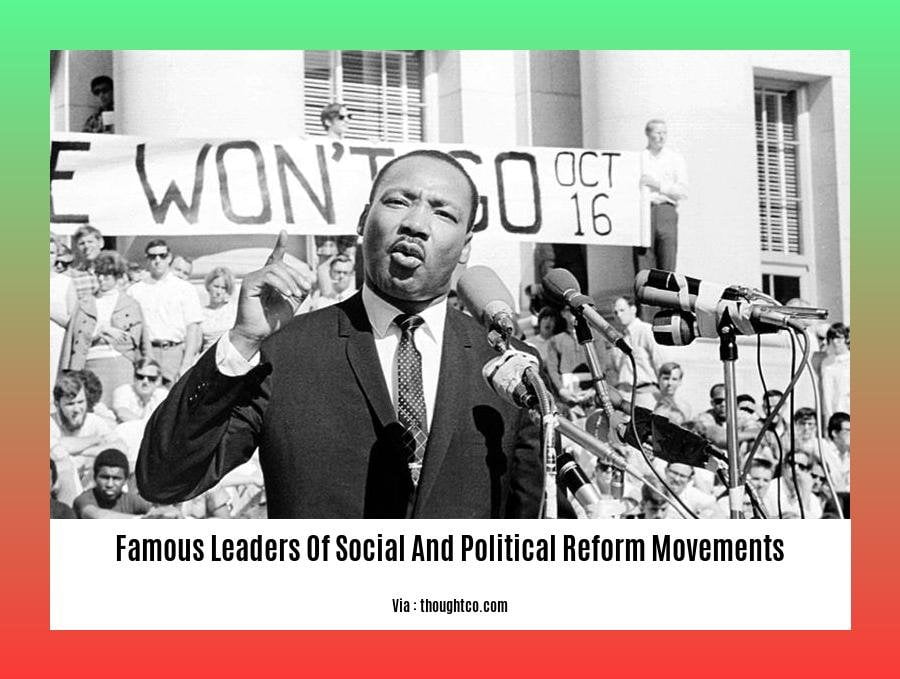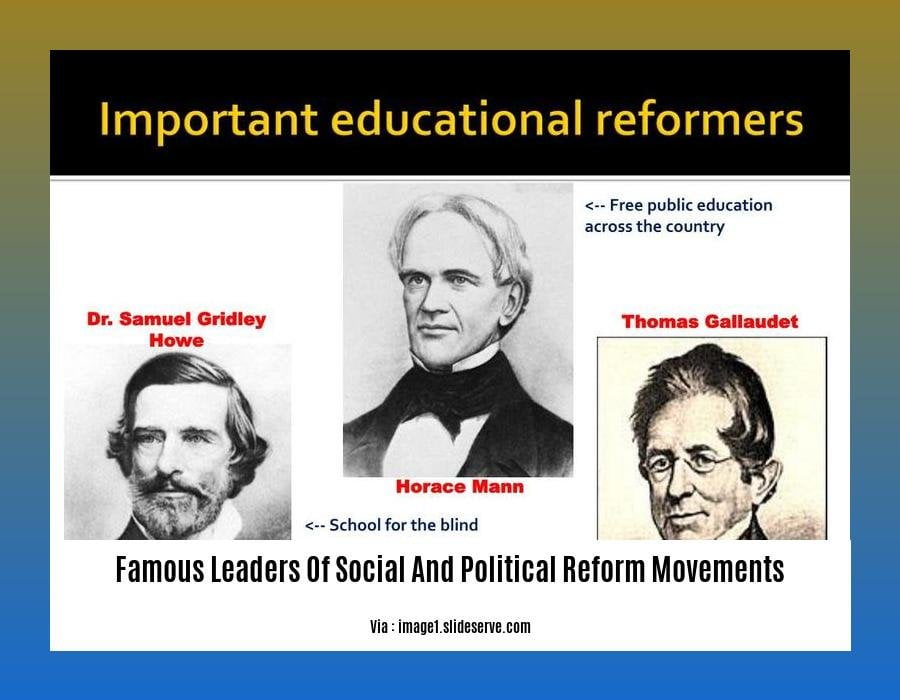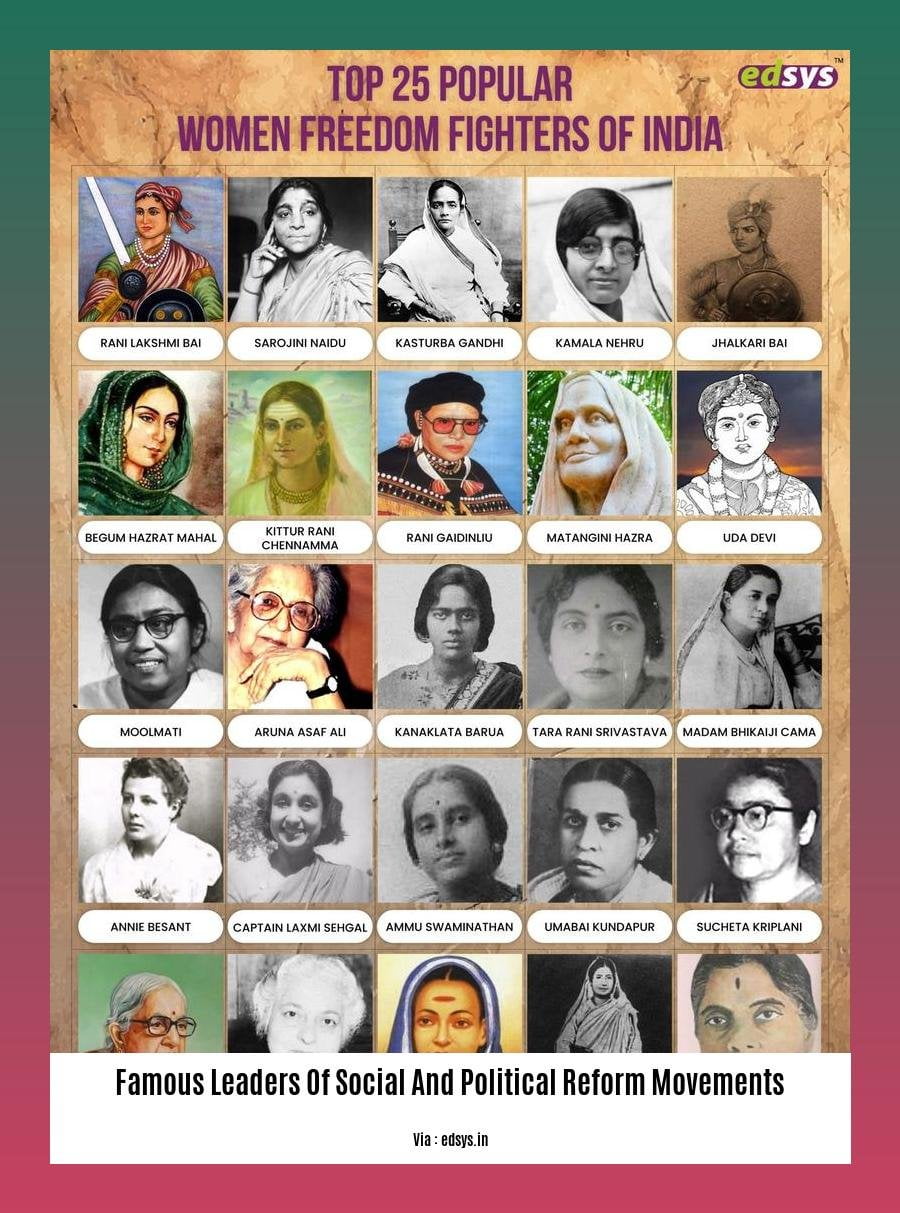**Famous Leaders of Social and Political Reform Movements: Inspiring Change and Shaping History** – Throughout history, dedicated and pioneering leaders have spearheaded social and political reform movements that have indelibly shaped the course of human history. These remarkable individuals, driven by a profound belief in justice, equality, and progress, have challenged the status quo and ignited transformative change across the globe.
Key Takeaways:

- Martin Luther King, Jr. advocated nonviolent civil disobedience in the U.S. Civil Rights Movement.
- Emmeline Pankhurst led the fight for women’s suffrage in England with protests and hunger strikes.
- Brenda Howard played a vital role in the modern LGBT rights movement.
- Nelson Mandela resisted apartheid in South Africa, leading to his imprisonment and the eventual end of the system.
- The Environmental Movement has been active since the 1950s, resulting in environmental laws and protections.
Famous Leaders of Social and Political Reform Movements
Iconic Figures Who Transformed Societies:
From tackling racial injustice to advocating for women’s rights, these legendary leaders have left an indelible mark on history.
Martin Luther King, Jr.: A beacon of the Civil Rights Movement, King’s nonviolent approach and powerful oratory inspired a nation to confront racial inequality.
Emmeline Pankhurst: A tireless champion for women’s suffrage, Pankhurst organized protests and led the Women’s Franchise League, playing a pivotal role in securing voting rights for women.
Brenda Howard: Known as the “Mother of Pride,” Howard was a trailblazing bisexual and polyamorous activist who fought tirelessly for LGBT rights.
Nelson Mandela: A symbol of resistance against apartheid, Mandela’s imprisonment and subsequent leadership of South Africa inspired a world to stand against racial oppression.
Environmental Movement Pioneers:
In the 1950s, concerns over water and air quality sparked the environmental movement, which culminated in the passage of the National Environmental Policy Act, recognizing the importance of protecting our planet.
These famous leaders of social and political reform movements stand as testaments to the power of human agency. Their courage, resilience, and unwavering belief in change have transformed societies, empowering individuals, and shaping the course of history.
To further delve into the lives and contributions of these influential figures, explore the articles on the greatest social reformers in history, influential leaders of reform and change, and pioneering leaders of progressive movements.
Key political reform efforts
The Progressive Era in the United States, spanning the late 19th and early 20th centuries, was a pivotal period marked by an array of key political reform efforts. This era was driven by a surge of public activism and a demand for change in response to the rapid industrialization and economic inequality that characterized the time.
Causes of the Progressive Era:
Rampant Industrialization: The rapid growth of industries led to immense wealth and power concentrated in the hands of a few corporations, resulting in economic disparity and exploitation of the working class.
Political Corruption: The influence of big businesses in politics led to widespread corruption, undermining public trust in government institutions.
Goals of the Progressive Era:
Strengthening the National Government: Progressives sought to enhance the power of the federal government to regulate corporations and protect citizens from exploitation.
Addressing Social and Economic Issues: They aimed to alleviate poverty, improve working conditions, and expand access to education and healthcare for the masses.
Promoting Civic Engagement: Progressives believed in the importance of public participation in decision-making processes and advocated for increased voter turnout and civic involvement.
Key Reforms of the Progressive Era:
Strengthening Public Sphere and Civic Engagement:
- Introduction of the initiative, referendum, and recall processes to give citizens a direct voice in policy-making.
- Establishment of public libraries, settlement houses, and community centers to foster civic education and engagement.
Government Regulation of Industry:
- Enactment of antitrust laws to break up monopolies and prevent unfair business practices.
- Implementation of regulations on food and drug safety, as well as labor conditions.
Expanding Access to Education and Healthcare:
- Establishment of public high schools and universities to increase educational opportunities.
- Implementation of social welfare programs such as unemployment insurance and workers’ compensation.
Key Takeaways:
- The Progressive Era was a time of great social and political upheaval, driven by a desire for change and reform.
- The key reforms of the era aimed to strengthen the national government, address economic inequality, and promote civic engagement.
- These reforms had a profound impact on American society, shaping the political landscape and improving the lives of ordinary citizens.
Most Relevant URL Source:
Key ideas and issues in the Progressive Era
Causes:
– Rapid industrialization and urbanization
– Corruption and political machines
– Social and economic problems
Goals:
– Strengthen the national government
– Address economic inequality
– Promote social justice
– Improve public health and education
– Protect the environment
Reforms:
– Initiative, referendum, and recall processes
– Antitrust laws
– Regulations on food and drug safety, labor conditions
– Public high schools and universities
– Unemployment insurance, workers’ compensation
Key Takeaways:
– The Progressive Era was a time of great social and political change in the United States.
– Key ideas and issues that drove the era included the need for stronger government regulation of business, improved social welfare programs, and greater political participation by citizens.
– The Progressive Era was a time of great progress for the United States, as many important reforms were passed that helped to improve the lives of Americans.
Citation:
–

FAQ
Q1: Who are the originators of progressive ideals and efforts?
Q2: Name some notable progressive leaders.
Q3: What are some key political reform efforts that progressives have championed?
Q4: What are some key ideas and issues that progressives have focused on?
Q5: What are some of the lasting effects of the Progressive Era?
- Unlock Water’s Symbolism: A Cross-Cultural Exploration - April 20, 2025
- Identify Black and White Snakes: Venomous or Harmless? - April 20, 2025
- Unlocking Potential: Origins High School’s NYC Story - April 20, 2025















